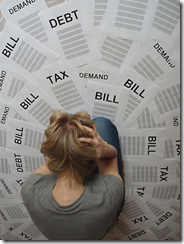Megan McArdle has wrestled with this question and came up with a wonderfully clear answer:
If people really acted as if the choice to default were morally neutral, we’d either lose most of our credit system, or the legal rules would have to be much more punitive.
That doesn’t answer the root question but it is a practical fact that many people seem to forget: The ease with which one person can get a loan is inversely proportional to how faithfully other people repay their own. Without a shared monetary morality, our financial life as we know it cannot continue to exist.
Perhaps moral is the wrong word to use here; ethical would be a better word choice in my opinion. Proceeding from there, let me say that yes, there is an absolute ethical obligation that we take on when we borrow money from someone else – specifically to repay it in accordance with the agreement we made with the other party.
The fact that the other party may be a giant financial conglomerate makes no difference re the ethics of the situation. If you borrow more than you can pay back or simply choose to default on your obligations, you are in fact acting unethically.
If one must look for scapegoats to hang for the current financial situation, those people who failed to meet their obligation to repay their debts must be first on the list of suspects.
